5 books about Amateur theater
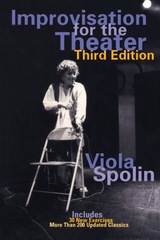
Improvisation for the Theater
A Handbook of Teaching and Directing Techniques
Viola Spolin
Northwestern University Press, 1999
Here is the thoroughly revised third edition of the bible of improvisational theater.
Viola Spolin's improvisational techniques changed the very nature and practice of modern theater. The first two editions of Improvisation for the Theater sold more than 100,000 copies and inspired actors, directors, teachers, and writers in theater, television, film. These techniques have also influenced the fields of education, mental health, social work, and psychology.
Viola Spolin's improvisational techniques changed the very nature and practice of modern theater. The first two editions of Improvisation for the Theater sold more than 100,000 copies and inspired actors, directors, teachers, and writers in theater, television, film. These techniques have also influenced the fields of education, mental health, social work, and psychology.
[more]
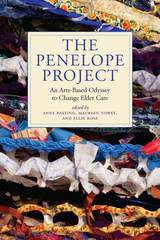
The Penelope Project
An Arts-Based Odyssey to Change Elder Care
Anne Basting, Maureen Towey, and Ellie Rose
University of Iowa Press, 2016
Of the 15,000 nursing homes in the United States, how many are places you’d want to visit, much less live in? Now that people are living longer and more of the population are elderly, this question is more important than ever, particularly for people with disabilities. We must transform long-term care into an experience we and our loved ones can face without dread. It can be done. The Penelope Project shows how by taking readers on an ambitious journey to create a long-term care community that engages its residents in challenging, meaningful art-making.
At Milwaukee’s Luther Manor, a team of artists from the University of Wisconsin’s theatre department and Sojourn Theatre Company, university students, staff, residents, and volunteers traded their bingo cards for copies of The Odyssey. They embarked on a two-year project to examine this ancient story from the perspective of the hero who never left home: Penelope, wife of Odysseus. Together, the team staged a play that engaged everyone and transcended the limits not just of old age and disability but also youth, institutional regulations, and disciplinary boundaries.
Inviting readers to see through the eyes of residents, students, artists, staff, family members, and experts in the fields of education, long-term care, and civically engaged arts practice, this book underscores the essential role of the arts and humanities in living richly. Waiting, as Penelope waited, need not be a time of loss and neglect. The Penelope Project boldly dreams of how to make late life a time of growth and learning. If you dream of improving people’s lives through creative endeavors, this book provides practical advice.
At Milwaukee’s Luther Manor, a team of artists from the University of Wisconsin’s theatre department and Sojourn Theatre Company, university students, staff, residents, and volunteers traded their bingo cards for copies of The Odyssey. They embarked on a two-year project to examine this ancient story from the perspective of the hero who never left home: Penelope, wife of Odysseus. Together, the team staged a play that engaged everyone and transcended the limits not just of old age and disability but also youth, institutional regulations, and disciplinary boundaries.
Inviting readers to see through the eyes of residents, students, artists, staff, family members, and experts in the fields of education, long-term care, and civically engaged arts practice, this book underscores the essential role of the arts and humanities in living richly. Waiting, as Penelope waited, need not be a time of loss and neglect. The Penelope Project boldly dreams of how to make late life a time of growth and learning. If you dream of improving people’s lives through creative endeavors, this book provides practical advice.
[more]
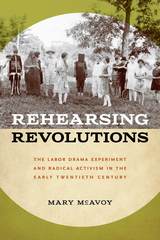
Rehearsing Revolutions
The Labor Drama Experiment and Radical Activism in the Early Twentieth Century
Mary McAvoy
University of Iowa Press, 2019
Choice Outstanding Academic Title, 2019
George Freedley Memorial Award Finalist, 2020
Between the world wars, several labor colleges sprouted up across the U.S. These schools, funded by unions, sought to provide members with adult education while also indoctrinating them into the cause. As Mary McAvoy reveals, a big part of that learning experience centered on the schools’ drama programs. For the first time, Rehearsing Revolutions shows how these left-leaning drama programs prepared American workers for the “on-the-ground” activism emerging across the country. In fact, McAvoy argues, these amateur stages served as training grounds for radical social activism in early twentieth-century America.Using a wealth of previously unpublished material such as director’s reports, course materials, playscripts, and reviews, McAvoy traces the programs’ evolution from experimental teaching tool to radically politicized training that inspired overt—even militant—labor activism by the late 1930s. All the while, she keeps an eye on larger trends in public life, connecting interwar labor drama to post-war arts-based activism in response to McCarthyism, the Cold War, and the Civil Rights movement. Ultimately, McAvoy asks: What did labor drama do for the workers’ colleges and why did they pursue it? She finds her answer through several different case studies in places like the Portland Labor College and the Highlander Folk School in Tennessee.
[more]
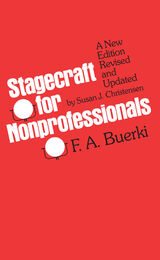
Stagecraft for Nonprofessionals
F. A. Buerki; Revised by Susan J. Christensen
University of Wisconsin Press, 1983
As the nonprofessional theatre continues to grow in popularity, its technology expands at a dizzying rate, presenting exciting new opportunities and challenges for all nonprofessional theatre craftsmen. This new edition of a stage manager’s old friend takes into account many aspects of the new theatre technology, insuring the book’s lasting place in college, high school, and community theatres everywhere. It is a book more likely to be found backstage on a stepladder than on a library shelf, and this is exactly what the author has intended. The emphasis is on simplicity, economy, and practicability. It is a book that can help now to put any play into production.
[more]
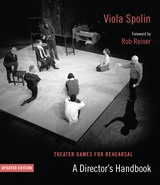
Theater Games for Rehearsal
A Director's Handbook, Updated Edition
Viola Spolin with a foreword by Rob Reiner
Northwestern University Press, 2010
Theater Games for Rehearsal: A Director’s Handbook, first published in 1985, is a practical application of Viola Spolin’s famous method that guides directors and their companies step-by-step through all phases of the rehearsal period. Spolin shows in easy-to-follow detail how her techniques can be used for a variety of theater situations, ranging from selecting plays or material to be performed, casting, and building a harmonious company to warming up actors, creating stage space, and overcoming opening night jitters.
The edition reflects Spolin’s wished-for updates: five important exercises have been added, and instructions presenting her improvisational approach have been clarified throughout. Her wealth of useful notes remain undiminished. Sidecoaching instructions and game evaluations are boxed and highlighted for on-the-spot reading by the director, in rehearsal. Viola Spolin has been called "the high priestess of improvisational theater," and the method that she created andpresented in her books not only remains the pedagogical standard but has found an even wider audience beyond theater.
Featuring a new foreword by renowned film director Rob Reiner, the updated edition is a necessary addition to any theater bookshelf.
The edition reflects Spolin’s wished-for updates: five important exercises have been added, and instructions presenting her improvisational approach have been clarified throughout. Her wealth of useful notes remain undiminished. Sidecoaching instructions and game evaluations are boxed and highlighted for on-the-spot reading by the director, in rehearsal. Viola Spolin has been called "the high priestess of improvisational theater," and the method that she created andpresented in her books not only remains the pedagogical standard but has found an even wider audience beyond theater.
Featuring a new foreword by renowned film director Rob Reiner, the updated edition is a necessary addition to any theater bookshelf.
[more]
READERS
Browse our collection.
PUBLISHERS
See BiblioVault's publisher services.
STUDENT SERVICES
Files for college accessibility offices.
UChicago Accessibility Resources
home | accessibility | search | about | contact us
BiblioVault ® 2001 - 2025
The University of Chicago Press









